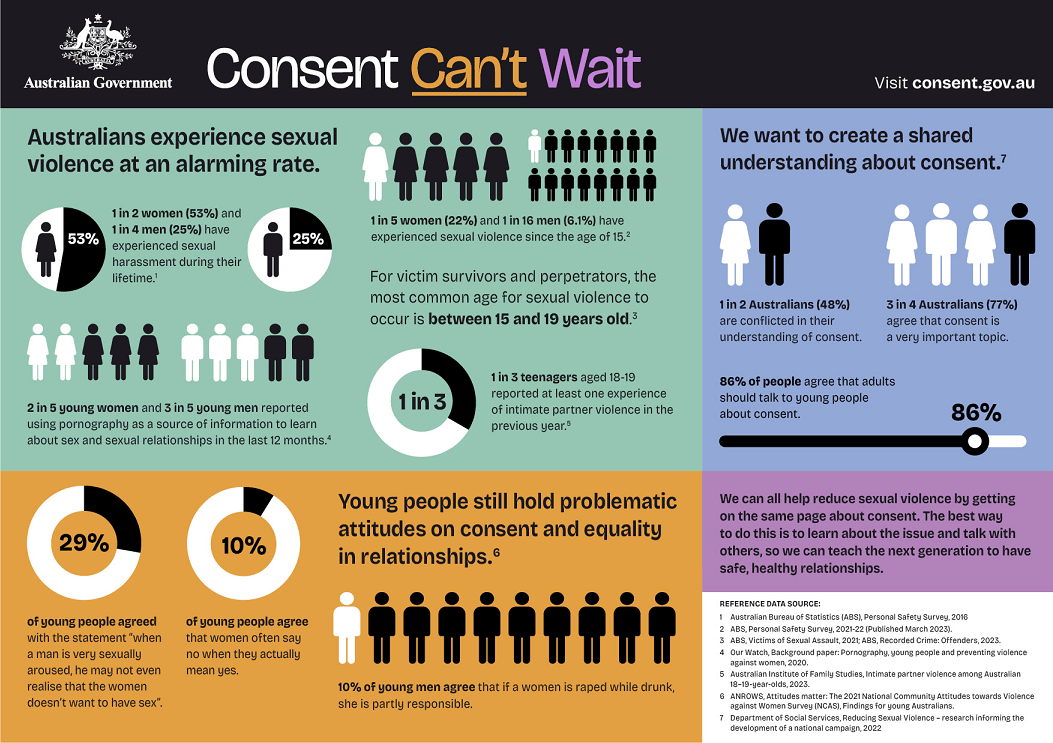The issue
Talking about consent, or even reading about it, may be triggering for some people. This includes those who have experienced, or are experiencing, sexual violence or other forms of trauma. Support is available. Refer to the Support Services page for more information.
Australians experience sexual violence at an alarming rate.
- 1 in 5 women (22 per cent) and 1 in 16 men (6.1 per cent) have experienced sexual violence since the age of 15.1
- 1 in 2 women (53 per cent) and 1 in 4 men (25 per cent) have experienced sexual harassment during their lifetime.2
- For female victims of sexual assault, the most common age for sexual violence to occur is between 15 and 19 years old.3
- Young men aged 15-19 have the highest offender rates of sexual violence.4
- 1 in 3 teenagers aged 18-19 had experienced at least one form of intimate partner violence in the last 12 months. 1 in 12 had experienced sexual abuse by someone they were dating. Sexual abuse is more prevalent among females.5
- Image based abuse is an increasing issue among young Australians:
- 24 per cent of young women aged 18- 24 have had a sexual image posted online or sent without their consent.6
- 82.7 per cent of young people aged 14-18 have reported receiving a sexually explicit nude or nearly nude photo or video of someone else, while 58.5 per cent reported having sent a sexually explicit nude or nearly nude photo or video of themselves.7
- Young people continue to hold problematic attitudes on consent and equality in relationships8:
- 20 per cent of young people believed that a lot of times women who say they were raped had led the man on and later had regrets.
- 29 per cent of young people agreed with the statement, “when a man is very sexually aroused, he may not even realise that the woman doesn’t want to have sex”.
Learn more about family, domestic and sexual violence or community attitudes towards violence against women
References:
1 Australian Bureau of Statistics (ABS), Personal Safety Survey, 2021-22 (published March 2023).
2 ABS, Personal Safety Survey, 2016.
3 ABS, Victims of Sexual Assault, 2021.
4 ABS, Recorded Crime: Offenders, 2023.
5 Australian Institute of Family Studies, Intimate partner violence among Australian 18–19-year-olds, 2023.
6 eSafety, Image-based abuse, eSafety website, 2017.
7 La Trobe University, 7th National survey of secondary students and sexual health, 2022.
8 ANROWS, Attitudes matter: The 2021 National Community Attitudes towards Violence against Women Survey (NCAS), Findings for young Australians, 2023.
Seeing beyond the problem
Consent is often seen as a problem to be solved. The reality is that consent is part of a set of skills you can learn to have healthy sexual relationships. Healthy relationships are inclusive of all sexual orientations and genders. They are based on trust, empathy, communication, equality, safety and respect.
This campaign aims to build a shared community understanding of consent. When consent is well understood, healthy sexual relationships will become the norm and sexual harm will be prevented.
